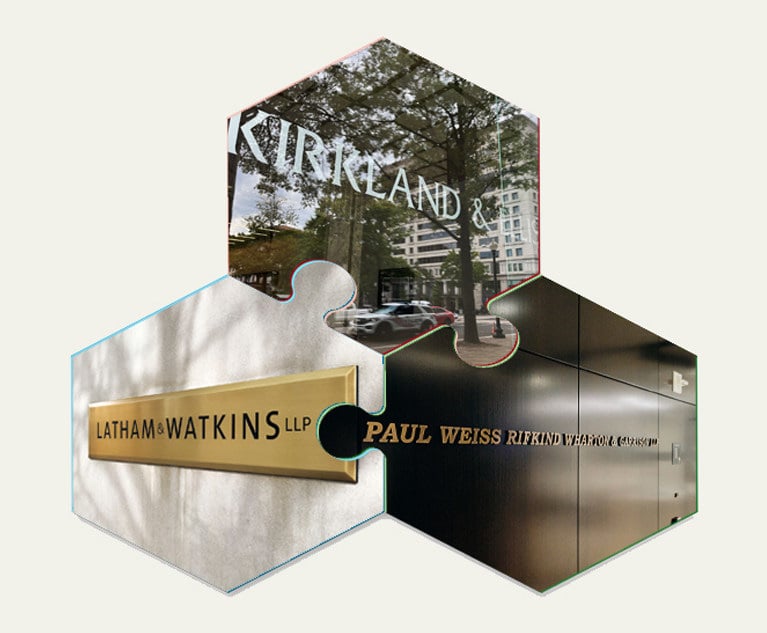The productivity problem: why are lawyers working longer hours in the age of innovation?
New research has found that despite much-heralded efficiencies offered by new technology, the number of hours lawyers are working is actually increasing
November 21, 2018 at 12:00 AM
4 minute read
Data from legal recruitment firm Douglas Scott's annual salary survey – which polled more than 3,000 legal professionals – has found that lawyers are working longer hours than ever before, yet productivity remains a challenge for many firms. In this article, Douglas Scott founder Kathryn Riley looks at what law firms can do to embrace innovation and tackle the productivity puzzle
Artificial intelligence, automation and other new technologies are propelling the legal industry forwards, bringing that elusive work/life balance ever closer. Yet despite this continued innovation, productivity remains a core challenge, as evidenced in NatWest's 2018 Legal Benchmarking Report.
However, we know that subdued productivity is not symptomatic of work ethic or commitment, the legal industry being populated as it is by high-achievers who work tremendously hard.
Our latest salary survey supports this sentiment, revealing that legal professionals are working an average of 6.21 hours per week longer than their contracted hours – an increase on 2017's average of five hours and 2016's average of 5.76 hours. Though this adds almost an entire day onto the working week, some will no doubt be surprised to hear that this figure isn't even higher – I don't doubt that there are some professionals working significantly more hours within a typical week.
While this commitment is a real positive for the industry, we know that working longer hours doesn't always guarantee quality output. It's therefore encouraging to see that firms are recognising this, with a continued focus across the board on supporting professionals to work in a more flexible way. Our data shows an increase in flexible working, with flexi-time now forming part of the benefits package of more than a quarter of legal professionals.
Talent
Those on top are taking the most strategic approach to recruitment and retention; it's no longer simply about filling roles but about finding the people who will shape the future of a law firm. New technologies and demand for emerging skills are changing the focus, although finding the right balance between people, purpose and culture remains paramount.
The old blueprint has been replaced by an agile approach – where once a rigid structure would typically be the norm within most firms, those that are thriving tend to be diverse and nimble, yet clear in approach. Firms must remain focused on a clear recruitment and retention strategy, with a flexible structure and a willingness to think outside the box.
Technology
Successful firms will continue to embrace advances in technology – conversations around robots replacing professionals or making lawyers redundant, while concerning for some, are hugely short-sighted. The workplace, whatever the industry, is becoming increasingly hybrid, although trailblazers who are already utilising new technologies will reap the benefits in the long-term. It's also important to remember that talented professionals don't want to work with old technologies.
New innovations – whether technologies, systems, processes or even ethos – can increase efficiencies, improve accuracy and even enhance client service, but only if it's ingrained within a firm's operations and culture. Getting this right is key for law firms focused on growth and remaining competitive in an evolving industry.
And while innovation is driving operational and procedural changes, firms shouldn't overlook the many ways it can be used to support employees. Flexible and virtual working within the legal industry would have been pie in the sky a decade ago, but advancements in technology have made it a reality.
Maximising productivity can only be achieved when talent and technology meet and support one another. Will it end the long hours working culture? The jury's out, but what we do know is that those firms committed to embracing new technology and more innovative ways of working will be first port of call for top talent.
- Click here for more from Legal Ladder, our dedicated careers blog to help lawyers and recruiters keep abreast of the key issues facing the profession
NOT FOR REPRINT
© 2025 ALM Global, LLC, All Rights Reserved. Request academic re-use from www.copyright.com. All other uses, submit a request to [email protected]. For more information visit Asset & Logo Licensing.
You Might Like
View All
DeepSeek’s AI Power Move: Will Lawyers Be the Next to Adapt or Perish?
6 minute read
Now That the Trump Era Has Begun, Change Is Coming. For Big Law, Change Is Already Here
6 minute readTrending Stories
- 1Uber Files RICO Suit Against Plaintiff-Side Firms Alleging Fraudulent Injury Claims
- 2The Law Firm Disrupted: Scrutinizing the Elephant More Than the Mouse
- 3Inherent Diminished Value Damages Unavailable to 3rd-Party Claimants, Court Says
- 4Pa. Defense Firm Sued by Client Over Ex-Eagles Player's $43.5M Med Mal Win
- 5Losses Mount at Morris Manning, but Departing Ex-Chair Stays Bullish About His Old Firm's Future
Who Got The Work
J. Brugh Lower of Gibbons has entered an appearance for industrial equipment supplier Devco Corporation in a pending trademark infringement lawsuit. The suit, accusing the defendant of selling knock-off Graco products, was filed Dec. 18 in New Jersey District Court by Rivkin Radler on behalf of Graco Inc. and Graco Minnesota. The case, assigned to U.S. District Judge Zahid N. Quraishi, is 3:24-cv-11294, Graco Inc. et al v. Devco Corporation.
Who Got The Work
Rebecca Maller-Stein and Kent A. Yalowitz of Arnold & Porter Kaye Scholer have entered their appearances for Hanaco Venture Capital and its executives, Lior Prosor and David Frankel, in a pending securities lawsuit. The action, filed on Dec. 24 in New York Southern District Court by Zell, Aron & Co. on behalf of Goldeneye Advisors, accuses the defendants of negligently and fraudulently managing the plaintiff's $1 million investment. The case, assigned to U.S. District Judge Vernon S. Broderick, is 1:24-cv-09918, Goldeneye Advisors, LLC v. Hanaco Venture Capital, Ltd. et al.
Who Got The Work
Attorneys from A&O Shearman has stepped in as defense counsel for Toronto-Dominion Bank and other defendants in a pending securities class action. The suit, filed Dec. 11 in New York Southern District Court by Bleichmar Fonti & Auld, accuses the defendants of concealing the bank's 'pervasive' deficiencies in regards to its compliance with the Bank Secrecy Act and the quality of its anti-money laundering controls. The case, assigned to U.S. District Judge Arun Subramanian, is 1:24-cv-09445, Gonzalez v. The Toronto-Dominion Bank et al.
Who Got The Work
Crown Castle International, a Pennsylvania company providing shared communications infrastructure, has turned to Luke D. Wolf of Gordon Rees Scully Mansukhani to fend off a pending breach-of-contract lawsuit. The court action, filed Nov. 25 in Michigan Eastern District Court by Hooper Hathaway PC on behalf of The Town Residences LLC, accuses Crown Castle of failing to transfer approximately $30,000 in utility payments from T-Mobile in breach of a roof-top lease and assignment agreement. The case, assigned to U.S. District Judge Susan K. Declercq, is 2:24-cv-13131, The Town Residences LLC v. T-Mobile US, Inc. et al.
Who Got The Work
Wilfred P. Coronato and Daniel M. Schwartz of McCarter & English have stepped in as defense counsel to Electrolux Home Products Inc. in a pending product liability lawsuit. The court action, filed Nov. 26 in New York Eastern District Court by Poulos Lopiccolo PC and Nagel Rice LLP on behalf of David Stern, alleges that the defendant's refrigerators’ drawers and shelving repeatedly break and fall apart within months after purchase. The case, assigned to U.S. District Judge Joan M. Azrack, is 2:24-cv-08204, Stern v. Electrolux Home Products, Inc.
Featured Firms
Law Offices of Gary Martin Hays & Associates, P.C.
(470) 294-1674
Law Offices of Mark E. Salomone
(857) 444-6468
Smith & Hassler
(713) 739-1250











